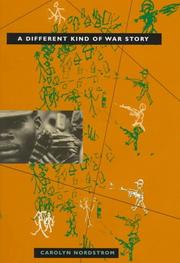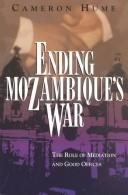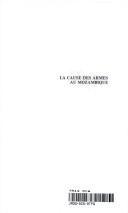| Listing 1 - 7 of 7 |
Sort by
|
Book
ISBN: 281114403X 2811122516 Year: 1990 Publisher: Paris : Éditions Karthala,
Abstract | Keywords | Export | Availability | Bookmark
 Loading...
Loading...Choose an application
- Reference Manager
- EndNote
- RefWorks (Direct export to RefWorks)
Lorsque la RENAMO (Résistance nationale mozambicaine) effectue ses premières opérations de guérilla sur le territoire mozambicain, en 1977, elle n'est qu'un groupe mercenaire à la disposition de la bourgeoisie coloniale rhodésienne. Une dizaine d'année plus tard, si elle bénéficie encore de soutiens logistiques et financiers extérieurs décisifs (Afrique du Sud), elle a changé de nature : la RENAMO est devenue un corps social armé profondément enkysté dans le tissu social mozambicain en zone rurale. Dénué de projet politique, ce "corps militaire" est néanmoins parvenu à soustraire une partie de populations rurales au contrôle de l'État, à les dresser contre lui, puis à se reproduire et à se développer au sein de la situation de guerre ainsi créée sur l'ensemble du territoire mozambicain. D'où provient le ressentiment rural à l'endroit du pouvoir ? Comment s'effectue, sur le terrain, le passage de la paix à la guerre ? Comment fonctionne le corps social armé qui s'en nourrit ? Comment subsistent, socialement et matériellement, les populations civiles désarmées dont deux forces rivales se disputent le contrôle ? A quelles exigences répondent l'usage systématique de la terreur et les massacres massifs de populations par la RENAMO ? A toutes ces questions, C. Geffray répond en exposant les résultats d'une enquête exceptionnelle effectuée en 1988, en zone de guerre. Il applique ainsi les méthodes de l'anthropologie sociale à un objet demeuré jusqu'à présent largement étranger à cette discipline : les guerres contemporaines. Christian GEFFRAY, né en 1954, est docteur de l'EHESS. Il a travaillé pendant trois ans ua Département d'Anthropologie de l'Université E. Monlane au Mozambique, effectuant plusieurs séjours dans le nord de ce pays à partir de 1983. Il est chercheur à l'ORSTOM depuis 1988.
Guerrillas --- RENAMO (Organization) --- Mozambique --- Politics and government

ISBN: 0812216210 0812234065 Year: 1997 Publisher: Philadelphia University of Pennsylvania Press
Abstract | Keywords | Export | Availability | Bookmark
 Loading...
Loading...Choose an application
- Reference Manager
- EndNote
- RefWorks (Direct export to RefWorks)
Violence --- War and society --- RENAMO (Organization) --- History. --- Mozambique --- History
Book
ISBN: 0904379094 Year: 1988 Publisher: London Christian Aid
Abstract | Keywords | Export | Availability | Bookmark
 Loading...
Loading...Choose an application
- Reference Manager
- EndNote
- RefWorks (Direct export to RefWorks)
Dossier on civil war and social and economic development in Mozambique.
Terrorism --- Religious aspects --- Christianity --- RENAMO (Organization) --- Mozambique --- History

ISBN: 1878379372 Year: 1994 Publisher: Washington, D.C. United States Institute of Peace Press
Abstract | Keywords | Export | Availability | Bookmark
 Loading...
Loading...Choose an application
- Reference Manager
- EndNote
- RefWorks (Direct export to RefWorks)
International relations. Foreign policy --- Polemology --- Colonisation. Decolonisation --- Mozambique --- Economic conditions --- 1975 --- -FRELIMO --- RENAMO (Organization) --- FRELIMO
Book
ISBN: 0951605208 Year: 1990 Publisher: London ECASAAMA/UK
Abstract | Keywords | Export | Availability | Bookmark
 Loading...
Loading...Choose an application
- Reference Manager
- EndNote
- RefWorks (Direct export to RefWorks)
RENAMO (Organization) --- Europe --- Mozambique --- South Africa --- Foreign relations --- History --- Participation, South African.
Book
ISBN: 0812296907 0812252055 Year: 2020 Publisher: Philadelphia, Pennsylvania : University of Pennsylvania Press,
Abstract | Keywords | Export | Availability | Bookmark
 Loading...
Loading...Choose an application
- Reference Manager
- EndNote
- RefWorks (Direct export to RefWorks)
A sensitive ethnography of former Mozambican National Resistance (RENAMO) combatantsAfter sixteen years of civil war (1976—1992) between the Mozambican National Resistance (RENAMO) and the government of Mozambique, over 90,000 former combatants were disarmed and demobilized by a United Nations-led program. Former combatants were to find their ways as civilians again, assisted by community-based reintegration rituals. While the process was often presented as a success story of peace, renewed armed conflict involving RENAMO combatants in 2013 and onward suggests that the reintegration of former guerrillas was a far more complex story.In Former Guerrillas in Mozambique, Nikkie Wiegink describes the trajectories of former RENAMO combatants in Maringue, a rural district in central Mozambique. Rather than focus on violence, trauma, and the reacceptance of these ex-combatants by the community, Wiegink emphasizes the ways in which RENAMO veterans have navigated unstable and sometimes dangerous social and political environments during and after the war. She examines the experiences of both male and female war veterans and their attempts at securing a tolerable life.Based on fourteen months of fieldwork conducted long after the war ended, Former Guerrillas in Mozambique offers a critique of a notion of reintegration that assumes that the lives of former combatants are shaped first by a break with society when joining the armed group and later by a break with the past when demobilizing and a return to a status quo. Wiegink argues, instead, that former combatants' motivations, experiences, and interactions are not necessarily characterized by a rigid separation from their RENAMO past, but rather comprise a mixture of ruptures and continuities of relationships and networks, including families, the spiritual world, fellow former combatants, political parties, and the state.
Guerrillas --- Veteran reintegration --- Veterans --- War and society --- Society and war --- War --- Sociology --- Civilians in war --- Sociology, Military --- Combat veterans --- Ex-military personnel --- Ex-service men --- Military veterans --- Returning veterans --- Vets (Veterans) --- War veterans --- Armed Forces --- Retired military personnel --- Community reintegration, Veteran --- Post-deployment reintegration --- Reintegration, Veteran --- Veteran-community reintegration --- Resocialization --- Social conditions. --- Social aspects --- Reintegration --- RENAMO (Organization) --- Resistência Nacional Moçambicana --- Mozambique National Resistance --- Resistencia Nacional de Mocambique --- Moçambique National Resistance --- RNM --- MNR --- Mozambique --- History --- Maringue. --- Renamo. --- United Nations demobilization. --- central Mozambique. --- former combatants. --- guerrila warfare. --- resistance fighers.

ISBN: 2865372642 9782865372645 Year: 1990 Publisher: Paris Karthala
Abstract | Keywords | Export | Availability | Bookmark
 Loading...
Loading...Choose an application
- Reference Manager
- EndNote
- RefWorks (Direct export to RefWorks)
Internal politics --- Mozambique --- Guerrillas --- Guérillas --- RENAMO (Organization) --- Politics and government --- Politique et gouvernement --- History --- #SBIB:328H419 --- #SBIB:327.6H01 --- #SBIB:327.5H21 --- #SBIB:39A73 --- #SBIB:39A11 --- -Bushwhackers --- Francs-tireurs --- Guerillas --- Maquis --- Partisans --- National liberation movements --- Instellingen en beleid: andere Afrikaanse landen --- Internationale en diplomatieke relaties: specifieke conflicten --- Vrede – oorlog, oorlogssituaties --- Etnografie: Afrika --- Antropologie : socio-politieke structuren en relaties --- Resistência Nacional Moçambicana --- Mozambique National Resistance --- Resistencia Nacional de Mocambique --- Moçambique National Resistance --- RNM --- MNR --- -Guerrillas --- -Instellingen en beleid: andere Afrikaanse landen --- -#SBIB:328H419 --- -Internal politics --- Guérillas --- República de Moçambique --- República Popular de Moçambique --- Moçambique --- Mo-san-pi-kʻo --- People's Republic of Mozambique --- Mozambik --- Narodnai︠a︡ Respublika Mozambik --- NRM (Mozambique) --- NR Mozambik --- State of Mozambique --- Mosambiek --- Mosambik --- Volksrepublik Mosambik --- Msumbiji --- Província de Moçambique (Portugal) --- Province de Mozambique (Portugal) --- Colónia de Moçambique (Portugal) --- Mozambico --- Guerrillas - Mozambique --- Mozambique - History - Independence and Civil War, 1975-1994 --- Guérilla --- Guerre civile --- Resitência nacional Moçambicana --- Anthropologie --- 1975-1994 --- Enquêtes
| Listing 1 - 7 of 7 |
Sort by
|

 Search
Search Feedback
Feedback About UniCat
About UniCat  Help
Help News
News